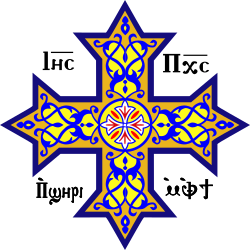Coptic music
| Part of a series on the |
| Copts |
|---|
| Culture |
| Regions |
| Denominations |
|
|
Coptic music is the music sung and played in the Coptic Orthodox Church and the Coptic Catholic Church. It has some roots in ancient Egyptian music and many elements of ancient Egyptian music continue to survive in Coptic liturgical music, with additional Byzantine and Hebrew influences.[1][2] It consists mainly of chanted hymns in rhythm with instruments such as cymbals (hand and large size) and the triangle. The percussion instruments used in the Coptic Church are unusual among Christian liturgies. Since similar instruments appear in ancient Egyptian frescoes and reliefs, some believe that they may represent a survival from a very old tradition. Coptic music is purely religious.
Coptic chant is an ancient tradition that has been linked to the musical practices of ancient Egypt.[3][4] One example is a hymn sung on Good Friday, which may be derived from melodies used by ancient Egyptian priests during royal funerary rites. [5]
Coptic music has been transmitted orally over thousands of years, and only recently have manuscripts, musical notes and books been used to record the Coptic music.[6]
The most famous modern Coptic cantor is the late Cantor Mikhail Girgis El Batanouny, whose recordings have helped preserve and unify many ancient chants that otherwise would have been lost. They were recorded in Bohairic Pronunciation.
Contemporary personalities contributing to Coptic music
[edit]- Mikhail Girgis El Batanouny
- Adel Kamel
- Ragheb Moftah
- Ernest Newlandsmith
- Nabila Erian
- Emmanuel Saad
- Abanob Ghobrial[7]
See also
[edit]References
[edit]- ^ "Music, Coptic". Claremont Coptic Encyclopedia. Retrieved 2025-04-06.
- ^ "The Egyptian Copts And Their Music" (PDF). tasbeha.org. Retrieved 2025-04-06.
- ^ https://ccdl.claremont.edu/digital/collection/cce/id/1446/rec/1
- ^ https://www.egyptindependent.com/humming-oldest-tune-history/
- ^ https://www.egyptindependent.com/humming-oldest-tune-history/
- ^ https://ccdl.claremont.edu/digital/collection/cce/id/1446/rec/1
- ^ "أبانوب غبريال.. عندما يكون شغف المغني إحياء لغتنا القبطية (حوار)". elmeezan.com (in Arabic). Retrieved 2020-06-30.
External links
[edit]- "The Transmission of Coptic Orthodox Liturgical Music: Historical and Contemporary Forms of Theorization, Translation, and Identity Construction" A PhD dissertation exploring the history and current practice and theory of Coptic music.
- "Coptic youth blog" Contains digital music and videos of Coptic liturgies, hymns, songs, and Coptic hymn lessons.
- "Coptic Music," Claremont Coptic Encyclopedia
- Complete collection of Cantor Mikhail Girgis El Batanouny's recordings of Coptic chant from coptichymns.net
- DeaconTube - A video learning website for Coptic Orthodox hymns
- coptichymns.net coptichymns.net - Sharing the Joy of Coptic Hymns Around the World
- copticheritage.org The Official Website of the Heritage of the Coptic Orthodox Church.
- Coptic Music, Hymns, and Rites Articles from coptichymns.net
- Coptic Music Articles
- Coptic Multimedia Archive at Saint TeklaHimanot Church of Egypt Articles
- Coptic Orthodox Liturgical Chant & Hymnody and the Ragheb Moftah Collection at the Library of Congress

